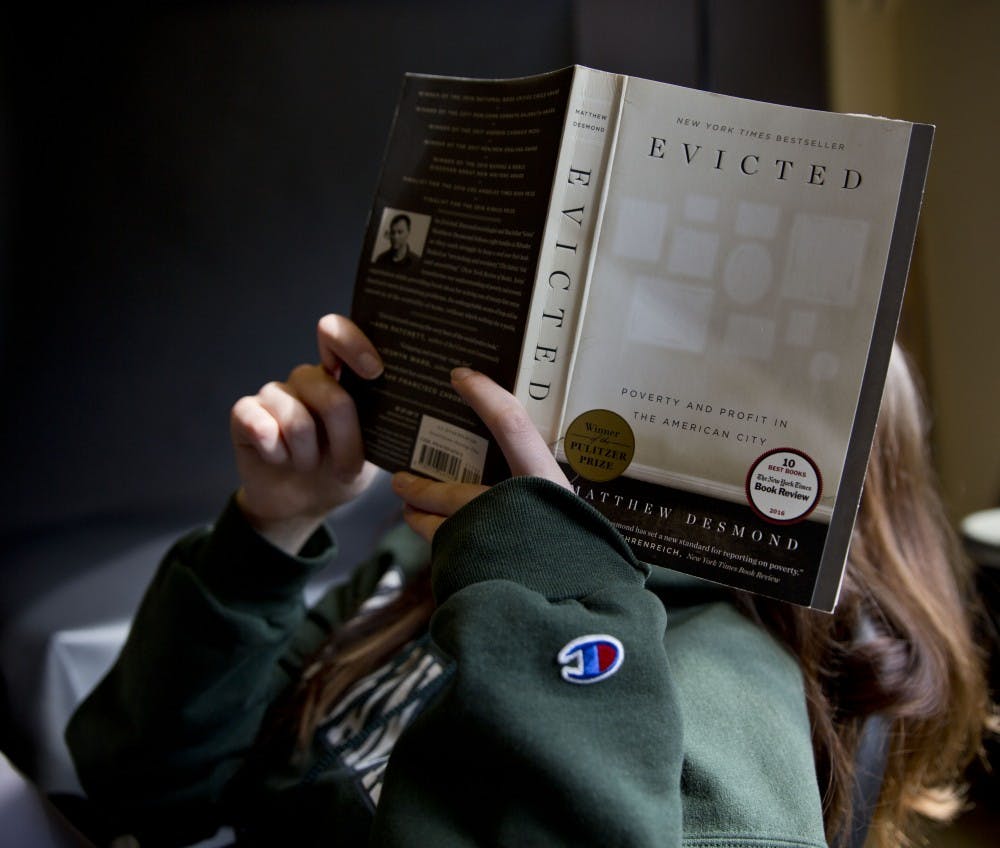For the 18th year, One Book, One Community — or OBOC — has worked to bring the communities within and around Michigan State together through literature. Times have changed since OBOC began in 2002, and the organization is looking to evolve in order to encourage students and community members to read the selected book each year.
OBOC announces a new book each spring selected by a committee composed of three members representing MSU, and two representing the city of East Lansing.
Last year was the first time the community was able to provide input via an online survey. Almost 500 people responded, according to OBOC Project Manager Erin Sonneveldt. The result of the survey was the selection of Matthew Desmond’s book, “Evicted: Poverty and Profit in the American City.”
The survey was created to “give more interest in the program and allow the community — both campus and the local community — to help guide the decision,” said Janet Lillie, the assistant vice president for community relations at MSU and a long-standing OBOC committee member.
Including the public’s input on the annual book selection is just one way OBOC is changing to fit the needs of the community.
Incoming freshmen at MSU are required to read — and are automatically billed for — the selected book. The author visits East Lansing in the fall for a public discussion of their book.
The selection process begins in October, when the committee begins reading and creating a short list of books that could potentially be chosen.
OBOC’s goal is to choose a book relevant to the current climate of the city, region, country or world. To assist in creating a dialogue, the author attends a question and answer session so the community can ask them questions that were submitted before the event.
“We try to pick a book that is meaningful to our communities and is readable, and one that maybe has somewhat of a different theme than previous years,” Sonneveldt said. “We try to develop programming that would be interesting for community members and MSU students and faculty to engage in.”
Sonneveldt said she hopes choosing books that are relevant and meaningful will inspire MSU students to really read the book.
“I think it’s the selection of the book that we hope inspires people to pick it up — whether it’s the material, the content, the message,” she said. “That, we hope, will engage people as readers.”
As the tides are changing, more and more students are choosing to spend their free time doing things other than reading, so OBOC is evolving to try to incorporate other facets of media to encourage people to communicate and foster opinions on specific issues. Choosing books that have accompanying movies, for instance, is one thing OBOC thinks will motivate student interest.
“This year, we’re promoting movies that are related to homelessness or that are related to housing insecurity,” Sonneveldt said. “We’re thinking about it a little bit more in terms of music, or thinking about other ways that readers — especially young people — are engaging in content. It’s something we are thinking about implementing (in) our future programs.”
It is estimated that over half of the population in East Lansing consists of non-permanent residents, so it is important to the organization to try and connect the permanent residents with MSU students.
OBOC is showing movies and having panel discussions and mini lectures related to the topic of housing insecurity at the East Lansing Public Library throughout September.
“It is a unique program that brings together our community — East Lansing, the greater Lansing area and our MSU community which includes students, faculty, staff and alumni .— to engage on topics that sometimes are very difficult. And it’s an opportunity for us to learn from each other, so I think that that’s what I find so interesting about this program.”
Support student media!
Please consider donating to The State News and help fund the future of journalism.
Discussion
Share and discuss “One Book, One Community to implement changes to encourage students to read annual book” on social media.







